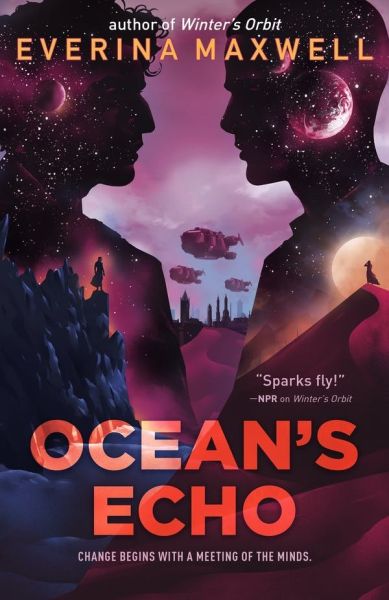A Man Without Conviction
Ocean’s Echo
By Everina Maxwell

13 Apr, 2023
Everina Maxwell’s 2022 Ocean’s Echo is a space opera. While it shares a place and time with Maxwell’s 2021 Winter’s Orbit, Ocean’s Echo takes place in an entirely different solar system and shares no characters with the earlier book.
Tennalhin “Tennal” Halkana is a wealthy young man who has a history of making bad life choices. This would make him an embarrassment to his hard-working sister Zinyary and to legislator Halkana, Tennal’s aunt (who is, thanks to the death of his parents, his guardian). But there’s worse. Tennal can read minds, which makes him a potential threat to the Orshan state.
One zany prank too many and Tennal discovers just how ruthless his aunt can be.
Tennal is summarily dispatched to the armed forces, where he is slated to be synched to an architect, as mind-controllers are called. Synched reader-architect pairs are extremely useful. They are also bonded for life, a future that alarms Tennal.
Surit Yeni, the architect to whom Tennal is scheduled to be synched, has an interesting history. His mother was an infamous traitor against the state, a participant in a reader uprising decades ago. Surit is an exemplary soldier but his last name ensures that everyone knows who his mother was.
Surit is also unbendingly ethical. As soon as he understands that Tennal is unwilling to be synched, he refuses to carry out the procedure. In this Surit is utterly within his rights, as involuntary synching is illegal. Given legislator Halkana’s determination, Surit’s ethics may only have bought time, not solved the problem.
The logical solution is for Tennal to flee beyond Orshan’s borders. True, the experiments with alien relics1 that created readers and architects were considered an unwise abomination by the other members of the galaxy-spanning Resolution treaty2. It is illegal for the mentalists to venture into galactic space. However, it’s impossible to tell if someone is a mentalist by looking at them. As long as Tennal doesn’t do anything stupid, he should be undetected.
Given Tennal’s history, it would be reasonable to expect the stumbling block on the great escape to be “Tennal does something stupid.” Not so! Instead, an ambitious governor opts for unsanctioned self-promotion and begins a coup attempt. Tennal and Surit are in a position to confound it … but only if they synch.
~oOo~
In legislator Halkana’s defense, she does have Tennal’s best interests at heart, at least as she sees them. If Tennal knew what she planned, he would be outraged, as her real plan for Tennal is much worse than simply mind-linking him to a stranger. There’s a reason the son of a traitor got tapped to link with her nephew.
Note on the worldbuilding: the two unrelated polities we’ve seen so far suggest that there’s a dire need for political reform. The text does mention (once) an election (“my aunt’s election team”), so there’s democracy of a sort. But the sense one gets from the political machinations described is that this state is an oligarchy with a democratic façade. It’s very clear that the powerful cheerfully ignore any laws that are personally inconvenient. Have I said that I’m tired of reading about oligarchies and authoritarian states?
I cannot help but notice that there are a lot of parallels between Tennal and Winter’s Orbit’s Prince Kiem (the other novel by this author). Both protagonists answer to a powerful woman who is not their mother; both are disappointments to their kin; both feel a bit abashed but not abashed enough to have changed their behavior. In the end both of them discover that they do have consciences after all. Even when said consciences aren’t convenient.
Well … a great many authors tend to recycle characters types AND charming reprobates are so very plot-friendly.
The novel is competently executed; readers who enjoyed Winter’s Orbit should enjoy Ocean’s Echo as well.
Ocean’s Echo is available here (Amazon US), here (Amazon Canada), here (Amazon UK), here (Barnes & Noble), here (Book Depository), and here (Chapters-Indigo).
1: I am not sure if there were only one alien precursor or if there were many of them, but poking at alien garbage is about as safe as cracking open RTGs to find out why they are so warm.
2: Although Maxwell’s two novels are not closely related, they do share a setting in which there is an interstellar compact called the Resolution. It doesn’t seem to be good for much. It’s clearly no good at all at protecting the little folk. It seems to be aimed at :
● unsuccessfully discouraging humans from dabbling in alien artifacts (important people are endangered when scientists do that) and
● providing legal pretexts for powerful states to crush weak ones.
